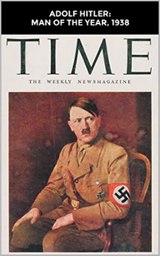If you find any part of this article to be offensive, just remember, I’ve written this history “as it was”, not “as I wished it were”.
When I was in school, we spent no time discussing the history of the 20th Century. I think that was because (a) most of my teachers were so old they lived through events like World War 2 and so didn’t think it was history, and (b) the fad at that time was what I call “the convoy system for education” where the whole class goes as slow as the slowest student — and so the school year would always be over before we got past the French Revolution.
I was fully an adult before I had the faintest idea of what World War 2 was about; as unlikely as it seems, I didn’t even know how Jews were involved. But I bought a pile of books on the subject and read them, and so eventually did learn about it. This article is an attempt to fill that gap for others as well (particularly of my generation).
The struggles of the 20th Century
The 20th Century is marked by a conflict between the “Atlantic Powers” (the USA, the UK, and France), Imperialism, and Marxism (and later Zionism). The Atlantic Powers played a very skillful game of setting the Imperialists and Marxists against each other; without this balancing act the Atlantic Powers never could have emerged victorious.
Prior to the 20th Century all there was was Imperialism. Every powerful nation got into the act; if you could conquer, you were entitled to take the spoils — at least until the subject nation revolted, or more likely, another major power took it from you. Under the philosophy of Imperialism there was no shame in starting a war, only in losing one.
The rise of free trade
In the 20th Century the Atlantic Powers believed in free trade — and for a very good reason — with free trade a technologically advanced nation could manufacture and sell finished goods very cheaply, and trade them with “lesser” nations, always to the advantage of the more “advanced” one.
While it may seem both sides in such a trading arrangement do benefit — the selling nation makes a profit, and the buying nation has access to inexpensive quality goods — the fact is that such a trade arrangement destroys the traditional economy of the importing nation. Small business owners, such as shoemakers, lose market share and are forced to close. Goods purchased must be paid for, and the more “advanced” nation is happy to buy raw materials in exchange. This reduces their trading partner to a nation of factory and agricultural workers. The “lesser” nation is subjugated, and it’s all done without firing a shot; using no guns, only sales contracts.
In this light, Imperialists in the 20th Century can be considered to be anachronisms. World War 1 was a war between the Imperialists and the commercialized Atlantic Powers and their allies. At the conclusion of this war France made a very specific point about starting a war being “immoral” and “unacceptable” and that Germany in particular had to pay reparations.
War guilt and reparations
Why was starting and fighting an offensive war suddenly a bad thing? The Atlantic Powers were once Imperialists themselves. But having decided that Commercialism was the easier and more profitable route, they could now take the moral high road and claim they themselves had no interest in war (except as a defensive measure). Traditionally, the victors in a war have always plundered the defeated. The difference now was that war had become “evil”, and that the losing nations had somehow “deserved” to be punished.
(Which is not to say there ever was anything good about war to begin with. People die, lives are ruined, and with modern technology, the human race as a whole could be destroyed.)
In particular, France had demanded an extreme amount of reparations from Germany per the Treaty of Versailles. (Something along the lines of, give us everything you’ve got, and when you’re done doing that, we’ll come back later and take the rest.)
Der Fuhrer
I personally do not believe Chancellor Adolf Hitler was insane. Evil, yes, but he knew what he was doing. To say he was insane would be to give him an excuse that he does not deserve. He did accomplish one thing, however. The Treaty of Versailles was like a death sentence to the German people, and he offered a way out. From this perspective, it’s no wonder the people backed him (especially those who didn’t care to ask too many questions).
 Many have said it’s too bad some other country didn’t stop him when he was still small and weak. So why didn’t they? Quite the contrary, the Atlantic Powers were fool enough to revere him, making him TIME magazine’s Man of the Year. The West supported him — because he was against Marxism. You can’t honor someone then claim you were against him all along.
Many have said it’s too bad some other country didn’t stop him when he was still small and weak. So why didn’t they? Quite the contrary, the Atlantic Powers were fool enough to revere him, making him TIME magazine’s Man of the Year. The West supported him — because he was against Marxism. You can’t honor someone then claim you were against him all along.
Enter the Marxists
At it’s most fundamental level, Marxism is a plot to take over the world, not by having one nation attack and subjugate another, but by fomenting an international class war, destroying the ruling classes of each nation; allowing the downtrodden working class to finally have their day in the sun. But the working class has never installed a Marxist regime on their own as a popular measure. Marxist governments have always been imposed from above, by powerful interests. At best, the working class has assisted the takeover, or at least refrained from opposing it; but they have never initiated it.
Regardless of promises of “power to the people”, wherever Marxism has been installed, the usurpers have always appointed themselves to be the leaders of the new government, living lives of splendor and luxury, consolidating their power at public expense. Equality is for the masses; the ruling elite is above all that.
Add to this the fact that Marxism believes in a world without borders; instead of taking over a nation at a time, the Marxist goal is to dominate the entire world at once.
Nonetheless, exploitation of the common people by the emergence of industrialism made life miserable for many. The Marxist theme promised a better life; although in countries that actually became Marxist, that promise was hollow as quality of life went down in every case.
Nazis vs. Reds
The Nazis believed that Marxism was not the answer. The leader believed that the system could take better care of people’s needs without a radical change in governmental structure. The philosophy, National Socialism, simply means “we take care of our own”. (Note that Nazi is just the first four letters of the word National in old German.)
All of this sounds very kind and beneficial, but just what does “our own” mean? The term was constrained to mean those of German ancestry, excluding even those of other heritages who were born in Germany and lived there all their lives. Everyone who was not a “real German”, or Aryan, became fair game to be exploited or eliminated by any means available. This brought about the concentration camp system and other atrocities.
And why were the Atlantic Powers so fond of him? Again, because he helped keep the Marxists in line, offering the German people an alternative. It was only later that he threatened the Atlantic Powers’ cozy position of world dominance by economics.
Theories of government
According to National Socialist theory, one race was the master race which had every right to start a war and subjugate the entire world. And just who is the master race? If the Aryans were the master race and they could prove it, that would demonstrate their right to rule. And that proof would come by winning the Second World War. Of course, that proof failed when Germany lost.
The Third Reich had no use for legislatures. The ruler believed that a legislature allowed individual representatives to duck responsibility for their actions — when a bad decision was made, “the group” was to blame, and no one in particular could be held accountable. Much better than a legislature, according to theory, was a single dictator who made all the decisions, and when things went wrong, could not escape responsibility.
Germany’s defeat not only meant that National Socialist theories about the Aryans being the master race were wrong (or at least not proven), but that the fault for losing an entire nation rested on one man’s shoulders — the head of state’s. No wonder Hitler committed suicide. (I personally believe he did so not to “cheat the hangman” or because of cowardice, but because he saw Germany’s failure was his own, for which he must accept the entire blame.)
While he faulted the Jews, or Semites, for much of his society’s problems I personally believe the Jews were very carefully set up to be the “fall guys”. For example, the executives of all the German Marxist organizations were Jews — but maybe this was carefully done to make them into targets. I personally do not believe the Jews are at the center of a vast conspiracy to dominate and exploit the rest of us, but by being allowed to fill the visible posts, they were there when people went looking for scapegoats.
Shifting alliances
In World War 2, the Atlantic Powers made common cause with the USSR (“the Allies”) to defeat the Imperialists (“the Axis”). Having supported the National Socialists to keep Marxism down, they Atlantic Powers were now supporting the USSR to keep Germany down! (The USA in particular has a history of manipulating opponents in this way.)
Italy, who supported the Atlantic Powers in World War 1 but did not receive a share of the spoils, “switched sides” by supporting the Axis in World War 2 (at least until leader Benito Mussolini fell from power).
(Incidentally, I personally believe France’s greatest contribution to the Allied cause in World War 2 was in surrendering so quickly. By being so incompetent on the battlefield, they gave Germany a false sense of confidence. This convinced the Wehrmacht they could quickly defeat the USSR and take over their oil fields. Fighting a two-front war was a major reason for Germany’s defeat.)
During World War 2 and for many years after, the need to keep Imperialism from reappearing was so great that the Atlantic Powers allowed the USSR to thrive. The Cold War never would have happened if the USSR weren’t given this window of opportunity. The partition of Germany was in particular a punishing and humiliating blow.
Into modern times
The Imperialist ideal is all but extinguished now. New generations of Germans look towards Commercialism now, just like the rest of the industrialized world. As the Imperialist ideal has faded away, so has the appeal of Marxism that had opposed it.
A side product of World War II was the displacement of many individuals, particularly Jews. Many decided to forsake the countries of their origin and settle in the Middle East instead (“Zionism”). The hostilities between the Jews and the Arabs in the Palestine/Israel area has been a regional one, with no direct participation by outside nations. I personally believe this struggle has the potential to escalate into a new World War, but that’s a 21st Century story, not a 20th Century one.
